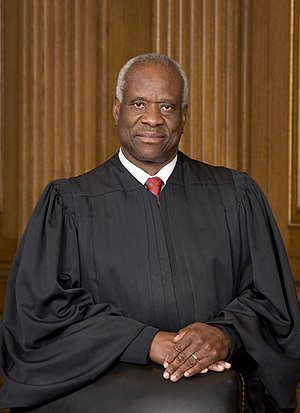Clarence Thomas
Clarence Thomas (1948-?) is an American attorney who has served as an Associate Justice on the U.S. Supreme Court since 1991. Thomas is the only incumbent African-American justice on the court and the second one in history, after Thurgood Marshall, who was his predecessor. He was born in Georgia, attended Holy Cross College in Worcester, Massachusetts, where he graduated with a bachelor’s degree in 1971, and went on to graduate from Yale Law School in 1974. Prior to his career on the Supreme Court, he served as the chairman for the Equal Employment Opportunity Commission (EEOC) and a judge on the District of Columbia circuit court. In the 1970s, he was the assistant attorney general of the State of Missouri.
Thomas was nominated to the Supreme Court by President George H. W. Bush, and the 1991 U.S. Senate confirmation hearings for Thomas were contentious after Anita Hill made public allegations of sexual harassment against him. She was a University of Oklahoma law professor and had previously been Thomas's assistant at the EEOC. Thomas denied the allegations, and the Senate eventually confirmed his appointment on a 52-48 vote in which 41 Republicans and 11 Democrats voted to confirm, and 46 Democrats and 2 Republicans voted to reject. At the time, only two women served in the senate, and one of them (Nancy Kasselbaum of Kansas, a Republican) voted to confirm.[1]
Unlike Marshall, Thomas is very conservative, arguably the most conservative on the current court. He rejects that the due process in the Fifth and Fourteenth Amendment guarantee the right to an abortion or engage in homosexual behavior, as he has opposed the ruling of Roe v. Wade and dissented in Lawrence v. Texas. Thomas espouses a strict constructionist view on the Commerce Clause to limit the power of the federal government to regulate intrastate activities. He also generally favor the law enforcement over criminal defendants in search and seizure cases.
His spouse, Virginia "Ginni" Thomas is a conservative activist. In 2010, she called the Brandeis University phone number of Professor Anita Hill and left a voicemail asking for an apology for her accusations against Justice Thomas in his confirmation hearings years earlier. Professor Hill called this action "inappropriate" and reported the incident to police, who were able to confirm that it was indeed, Ginni Thomas that left the message. Ms. Thomas confirmed publicly that it was her that left the message and said that she meant no offense in the action, that it was an ""olive branch". There are varying opinions on whether her activity does, or does not, constitute the appearance of conflict of interest for Justice Thomas.
Notes
- ↑ While only two women served in the senate in 1991 when Thomas was confirmed by a narrow vote, as of 2023, 25 women serve in the senate (9 Republicans, 1 independent, and 15 Democrats). It is reasonable to speculate that in many ways, the values represented on the Supreme Court are a few decades behind where society stands at any moment in time.
